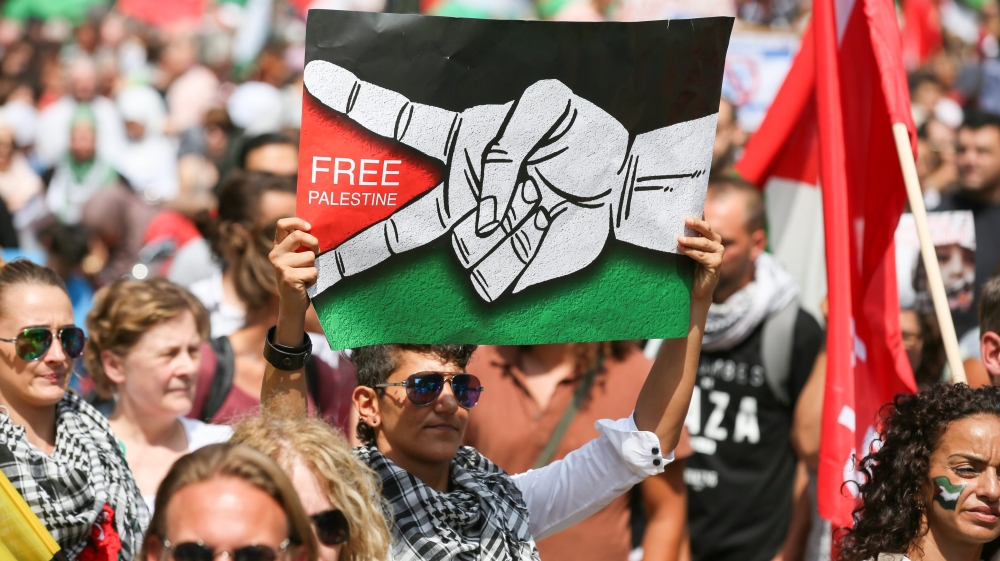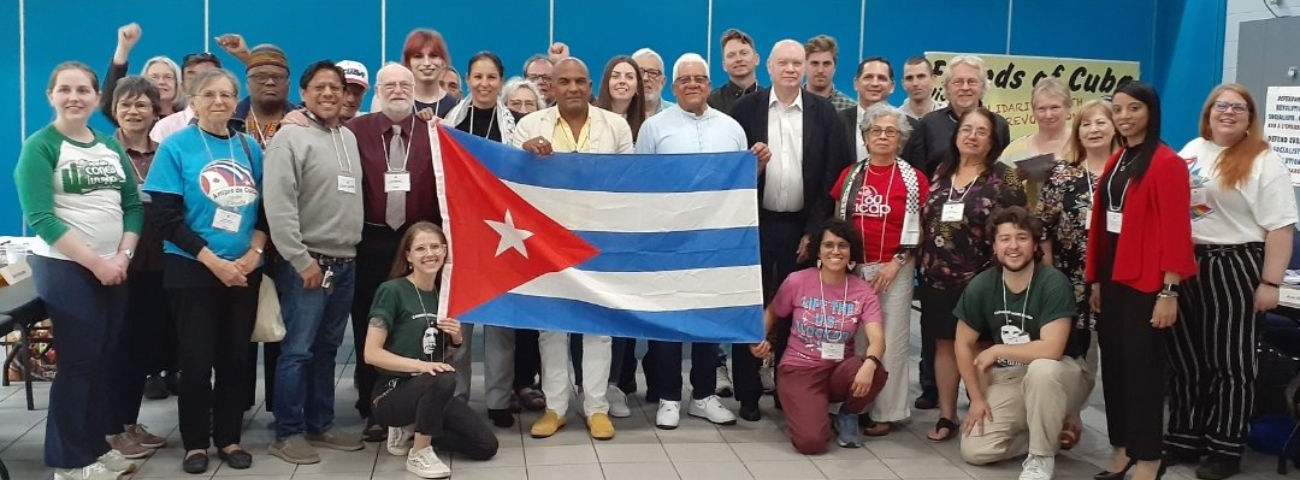To mark the International Day for Solidarity with the Palestinian People on November 29, People’s Voice interviewed long-time labour and international solidarity activist, Hassan Husseini, who is an organizer with Labour for Palestine.
PV: Could you start by telling us a bit about Labour for Palestine – how it was organized, what its work involves?
HH: The latest incarnation of Labour for Palestine was organized in the fall of 2017. At that time, there was an academic and activist conference organized at McMaster University in Hamilton, on international labour studies and international labour solidarity. Some of the people involved discussed relaunching Labour for Palestine, which previously existed but which had gone into a hiatus for a number of years.
The organization initially started in 2006, with the passing of Resolution 50 at the CUPE Ontario convention [supporting the boycott, divestment and sanctions (BDS) movement]. A number of CUPE activists started Labour for Palestine as an ad hoc committee of the Coalition Against Israeli Apartheid, and they produced a lot of policies, educational tools and guides for labour activists to do Palestine solidarity work within their own locals and organizations. The group was active for several years and did a lot of good work within CUPE and other unions and within the Canadian Labour Congress, but eventually their activities really dwindled.
So, in 2017 a number of us from mostly Ontario and Quebec agreed to get it going again. We’ve been steadily re-establishing the organization – we have agreed to a statement of unity [see sidebar] and have worked hard to expand our network and put the organization on a solid footing so that we can engage with labour activists across the country and deepen solidarity with the Palestinian people.
We are coming up to the International Day of Solidarity with the Palestinian People, on November 29. How is international solidarity particularly important to the Palestinian struggle? Also, how has international solidarity with Palestine changed or developed over the last decade?
The international solidarity movement with the Palestinian struggle has absolutely changed over the years, even within the labour movement. You and I could go back and remember the period in the late 1980’s and early 1990s, when struggle of the people of South Africa was successful. At that time, you would still see relations between labour in Canada and the Histadrut, which is the Israeli trade union federation that pre-dates the existence of the state of Israel and is considered one of the pre-state settler-colonial institutions that was a key actor in the Zionist colonization of Palestine. These were very intimate links, involving the CLC and many of its affiliates. Over the years, those links have been, I would say, severed. They are not officially severed, but while the CLC even recently invited the Histadrut to attend conventions, they never showed up because they knew they would not be welcomed on the convention floor by delegates.
I mention that because the rank and file within the labour movement, even before the CUPE resolution, had taken a position in favour of the Palestinian people and against Israel’s racist apartheid system and occupation. So, although we still sometimes have a hard time convincing some in the top echelons of the labour movement to take clear positions in support of the Palestinian people’s struggle, there is no doubt that they have lost control over the membership, the vast majority of whom are supportive of the liberation struggle of the Palestinian people.
The critical point, I would say, for international solidarity was the BDS movement, which came about after the failed peace process, the failure of the Oslo agreement and the crushing of the Second Intifada. These had given rise to a potential solution, but that failed because of the alignment of forces. We cannot forget here that the loss of the socialist bloc certainly had an impact on a lot of national liberation movements, including the Palestinian one – there was now a unipolar world dominated by US imperialism, and that certainly didn’t help the struggle of the Palestinian people, to be in negotiations when they were at their weakest.
So, that all failed and during the initial period of the peace process we witnessed an acceleration of the building of settlements, of the theft of Palestinian land and of the building of the apartheid wall, which included the theft of even more land that was part of ceasefire line of 1948-49. So, all of that – which also included increased repression of Palestinians and house demolitions – reached the point where there was a need for a new tool in the arsenal of the struggle. And that was the call for BDS, which was modelled after the South African anti-apartheid struggle and the boycott movement of the 50s, 60s, 70s and 80s. That was a turning point in the deepening and broadening of the international solidarity movement with the Palestinian people.
It was and continues to be quite effective – it really reached into sectors such as the student movement, the churches and the labour movement, in ways we hadn’t seen before. It almost “mainstreamed” the international solidarity movement in the West, and it has been such a threat to Zionists and to the project of apartheid and occupation, and their apologists in Canada, that you see politicians of almost all stripes, including our supposedly left-wing NDP, have ended up condemning or at least not defending it. You could look at it in a negative sense but you could also see in a positive way, in that it has been so successful that they have needed to oppose it and speak out against it. I look at in that context, that they’re responding to how positive the international solidarity movement has been.
As that campaign against BDS has intensified, is the movement shifting to respond to those attacks?
You have to, yes. You have to dedicate a bit of your energy to defensive battles. Instead of taking on new areas of work to deepen the BDS campaign, you have to stop and take stock of the attacks and strategize and respond. This is what we are seeing in Ontario right now, with the Ford government’s order in council adopting the International Holocaust Remembrance Alliance definition of anti-Semitism [which includes criticism of Israel]. But we’re keeping our eye on the ball, in that while we respond to what’s coming our way, we’re continuing to look to how we can chart new roads toward further successes in the BDS campaign, as far as the labour movement is concerned.
One of the issues we have is that we always focus on getting resolutions passed at conventions and conferences, but it’s really important to think about the next step after passing that resolution – to operationalize or materialize it concretely. I don’t want to minimize resolutions, though, because they have a political element, which is education and raising consciousness. Often, there is opposition to these resolutions at conventions – the supporters and apologists for Zionism attack and charge anti-Semitism – and the process of responding is an important political and ideological battle, to continue to engage active trade unionists and others on the “Why?” Why is the call for BDS important to union people? Why is this charge of anti-Semitism so bogus? It’s a preposterous charge but it takes people aback, so we need to be able to provide them with the tools to counter that propaganda.
So, in the context of that struggle to pass resolutions, we raise the political consciousness of trade union activists. But we need to take it a step further, and actually put those resolutions into action. We can do this, for example, through campaigns to challenge pension plans to actually divest from Israeli companies or companies that support the occupation.
These are the kinds of things that Labour for Palestine is strategizing around, to find the best way to move that forward. We just held a strategy session involving activists across the country, and we are currently working on a plan of action with specific campaigns and educational material that we can put into the hands of labour activists, to deepen and broaden solidarity with the Palestinian people.
I’m very excited about the prospects for our work going forward.
Contact Labour for Palestine on Facebook @Labour4Palestine.
[hr gap=”10″]
Get People’s Voice delivered to your door or inbox!
If you found this article useful, please consider subscribing to People’s Voice.
We are 100% reader-supported, with no corporate or government funding.




